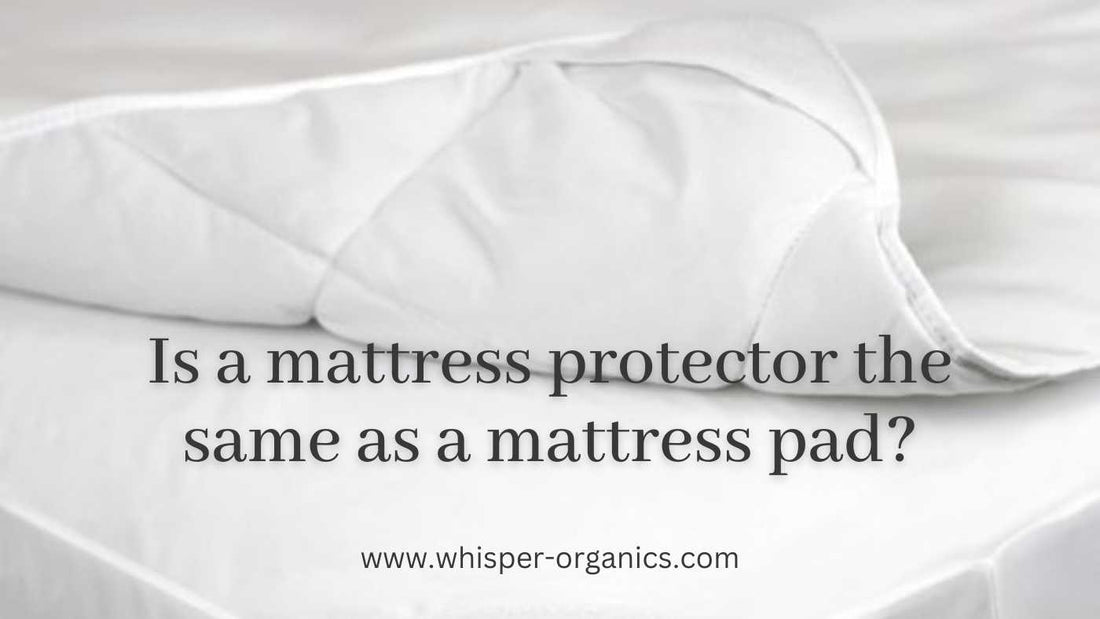You're undecided. You have a new mattress but don't know if you should buy a mattress protector or a mattress pad. Last time, you bought an expensive bedding but had to give it away because it's not what your mattress needed. Right now, you want to make sure you are buying the right item for your bed.
This article will help you know if you need a mattress protector or a mattress pad. It is divided into these headings:
What makes a good mattress protector?
What makes a good mattress pad?
Tips for taking care of your mattress protector and mattress pad
What is a mattress protector?
A mattress protector is necessary when you have a brand-new mattress. Most manufacturers design beds capable of keeping minimal drops of liquid that land on its quilted material. But your new mattress will not last long without extra protection.
Existing threats to your current mattress
You need a mattress protector to keep your mattress safe. Here's a list of threats that cut short a mattress's life:
Organic matter from your body. You shed something from yourself daily, such as sweat, saliva, tears, mucous, dead skin cells, hair, body oils, and other fluids.
Your pets. Aside from organic matter, your pets release dander and fur. And if you have pet cats, they may instinctively attempt to turn your mattress into a pad for sharpening their nails.
Critters in your mattress. Critters make homes out of your mattresses. They also feed on your body's by-products. Tiny organisms can turn your beautiful mattress into an ugly, dirty nest without quality mattress covers to serve as a dust mite barrier.
Any other allergens, organisms, and elements. Dust, pollen, mold, and mildew are prevalent threats to your mattress because they are ever-present in our surroundings. When these grow in your mattress cover, they attract bed bugs and dust mites.
Accidents. No matter how careful you are, accidents can cause damage to your mattress. Spilled drink, blood from wounds, tearing of fabric by pets, and children frolicking.
Mattress protectors make your bed water-resistant and stain-resistant. Mattress protectors give you a protective barrier against these threats. Buying one will keep your mattress lasting long and in the best condition.
What makes a good mattress protector?
The best mattresses are designed to last for more than a decade. But without a protector, a new mattress quickly wears off and breaks down. Getting the right mattress protector is important. Here are the features you need to consider.
Waterproofing. The primary feature of a good mattress protector is its waterproofing ability. Water and other liquids are the main enemies of mattresses because a moist foam is the breeding ground of bacteria, mold, and mildew.
It is vital to check the features of the waterproofing materials in the mattress protector you are eyeing. Most mattress protectors are 100% waterproof due to a thin layer of polyurethane sewn between its layers of cloth.
There are GOTS-certified mattress covers that have no synthetic sheet inside but are absorbent enough to keep liquids from reaching your mattress.
Comfort. Some waterproof materials used in mattress protectors can make you feel stiff and uncomfortable. Avoid protectors made from synthetic cloth since they will make you sleep hot.
If you're buying online, check for reviews saying it has a "plasticky" feel and makes crunchy sounds. You don't want to hear those noises whenever you move on your bed.
Breathability. What is breathability? Breathability helps regulate body temperature by keeping body heat at optimal levels. A breathable mattress protector keeps you cool and dry, even if it is 100% waterproof.
The breathability of a mattress cover is critical for keeping moisture away. Non-breathable comforters will make you sweat a lot while sleeping, especially when you are one of those hot sleepers.
When you awake, the sweat remains on your bed, making it inviting for mold, bed bugs, and dust mites.
Hypoallergenic features. This feature is essential, especially if someone in the household has allergies and asthma. Avoid mattress covers and bedding made from synthetic materials.
A hypoallergenic mattress protector is usually made from GOTS-certified organic cotton. This material prevents allergens from collecting in the mattress and wards off bed bugs and dust mites.
Easy to wash. Many mattress protectors can be machine-washed. To be sure, always check the label for washing instructions. Ask yourself if you can handle washing it at least once a month.
Your lifestyle preference. You may be the type of person who can only sleep soundly if your bed, from its covers and bed sheets to its fitted sheets, pillows, and blankets, are all environmentally friendly. Good news! There are organic and synthetic options in the market.
Choose what is best for your lifestyle. For example, you may prefer cotton, but you have a frequent bedwetter in the family. You may need to look deeper if you can consider eco-compatible options such as polyurethane.
Perfect fit. You must get your size right. Avoid wrestling with your sheets. The mattress protector must fit well with the size and depth of your mattress.
Also, check if it has elastic straps and deep pockets that keep your protector from moving while you toss and turn in your bed.
Overall, the best mattress protectors are waterproof, comfortable, breathable, hypoallergenic, and easy to wash. It should meet both your preferences and the size of your mattress.
What is a mattress pad?
A bed is good for sleeping when its foam is still several inches thick. Over time, an older bed loses the softness and sturdiness of its foam.
A mattress pad is best if you have been using your bed for over a year and its foam is fairly thin already. But it is also good to buy one if the bed you just bought lacks the softness you expected.
A mattress pad is designed for added comfort
Comfort is the main feature mattress pads offer. A mattress pad is a layer of bedding that will give you the extra comfort and extra support your bed lacks, just like what mattress toppers do.
Buying a mattress pad makes the top layer of your bed thicker and better. It gives your bed the extra padding and cushion needed to function well.
Here are some reasons for you to consider buying a mattress pad:
Your new bed is too firm and lacks that extra softness to lull you to sleep. A mattress pad adds to your bed's softness.
Your mattress feels uncomfortable. It's old, but you don't want to let go of it for some sentimental reasons. Perhaps buying a new bed is out of your budget. A mattress pad will help you keep your old mattress.
You need additional support and comfort for medical reasons. A mattress pad can provide enough comfort to help you rest well and manage your health condition.
You want to protect your mattress but also need more foam to complement your mattress' cushion. A good mattress pad has a thick layer of foam to make your entire mattress feel sturdy and soft again.
What makes a good mattress pad?
Support and comfort are the reasons why you need a mattress pad. While they also provide a protective shield, they are best coupled with older mattresses.
These are what you are to look for in a mattress pad
The right thickness. Choosing the proper thickness will depend on your needs, including medical reasons. Choose what will give you proper healthy support and comfort.
Your lifestyle. Your lifestyle is a good starting point for making your choices. For example, do you have family members who will share your bed? Are you worried that your mattress can't hold up your weight anymore? Consider your comfort level and sleeping preferences when buying a mattress pad.
How about preferring organic materials over those made from synthetic materials? You may be moving houses a lot, so do you prefer firmer and lighter ones over fluffier and heavier ones? The good news is that there are many choices. It would be best if you did some digging to find your best choice.
Budget considerations and extra features. When setting a budget, expect mattress covers with waterproofing, breathability, temperature regulation, natural fiber, hypoallergenic features, and resistance to insects like dust mites to be more expensive.
Mattress pads made from GOTS-certified organic cotton have all these features. These brands are pricier than those made from other materials. But because they're made from natural materials, you'll enjoy a healthy slumber with no threat of harmful chemicals reaching your skin.
Keep your mattress pad clean. Always check the label for washing instructions. Be careful with mattress pads that warn you about using too much heat or harsh detergents. Generally, mattress pads are washed with gentle detergent in warm water. Most can be sun-dried, air-dried, and tumble-dried.
Tips for taking care of your mattress protector and mattress pad
These are the steps to keep your mattress protector in the best condition:
- Check the label of your mattress cover for specific washing instructions.
- Wash the mattress protector before using it to eliminate odors and soften the material.
- Use only cold or lukewarm water on the gentle cycle. Never use hot water. The waterproofing material will weaken and become less effective.
- Use mild and non-bleach detergents. Harsh chemicals will damage your mattress protector.
- Check if you can tumble dry it or put it on low heat in the dryer. Always follow the manufacturer's instructions so you will not damage your mattress protector. The best way is to either sun-dry or air-dry them.
- Never send your mattress protectors for dry cleaning. The extreme heat will destroy their materials.
- Some mattress covers have encasements that are challenging to remove and put back in. Test your options and choose the best way to proceed.
Conclusion
Mattress pads and mattress protectors have different functions. Putting them side-by-side, we will see that:
- Mattress protectors are thinner than mattress pads.
- Mattress protectors add protection, while mattress pads add comfort and support.
- Mattress protectors generally help keep your mattress clean, hygienic, and firm, while mattress pads' primary function is to give you better sleep quality.
You may prefer one mattress cover that has both protection and comfort. Or, you may have the usual where you get one item to give you the best protection and a separate item from one that gives you the best comfort.
Mattress covers are crucial for your mattress' quality. The decision is yours. What is important is you get the protection and comfort you need to optimize sleep, keep your sleeping space clean and healthy, and make your mattress last longer.

